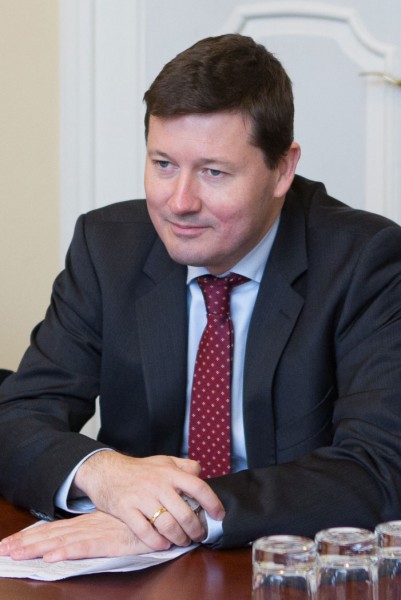Austria EU Representative Selmayr at Dispute Because Of "Blood Money" Statement
EU representative Martin Selmayr has called Austrian gas payments to Russia "blood money". Now reprimanded by Vienna and Brussels, EU Commission representative Martin Selmayr does not want to give up his job in Austria.
 The EU Commission representative Martin Selmayr, who has been reprimanded by Vienna and Brussels for his "blood money" statement, does not want to give up his job in Austria. / Picture: © Wikimedia Commons / Saeima [CC BY-SA 2.0 (https://creativecommons.org/licenses/by-sa/2.0)]
The EU Commission representative Martin Selmayr, who has been reprimanded by Vienna and Brussels for his "blood money" statement, does not want to give up his job in Austria. / Picture: © Wikimedia Commons / Saeima [CC BY-SA 2.0 (https://creativecommons.org/licenses/by-sa/2.0)]
In an unusually clear tone, Martin Selmayr, the representative of the European Commission in Vienna, has spoken out about Austria's ongoing gas payments to Russia. The representative of the EU Commission in Vienna expressed surprise at the amount of Russian gas still coming to Austria. "Blood money" is sent to Russia every day as a result, he said. Selmayr was quoted to the Foreign Ministry.
The fierce criticism of Austria's dependence on Russian gas is also irritating Brussels. The EU Commission distanced itself from the statements. "The Commission distances itself from the regrettable and inappropriate statements made by the head of the representative office in Austria," said a statement by the EU agency's deputy chief spokeswoman Dana Spinant, DiePresse newspaper reported. The EU Commission's statement added that it had asked Selmayr to "immediately report on the incident in Brussels."
Blood money to Russia
"Oh my God, 55 percent of Austria's gas continues to come from Russia," the EU representative said at the discussion event of the viennacontemporary Art Fair, as reported by DiePresse. Austria was financing Putin's war in such a way, he said, and no one was on Vienna's Ringstrasse to protest it. "This amazes me because blood money is sent to Russia every day with the gas bill," the Bonn native explained. While he understands the energy problems, Austria is a rich country and, like other states, can manage without Russian gas, he explained.
At the beginning of Russia's attack on Ukraine, Austria obtained 79 percent of its gas imports from Russia. The share dropped to 17 percent by October of the previous year. In recent months, however, the figures have been significantly higher again. In July, it was 66 percent, according to the Climate Protection Ministry.
Great indignation in Austria
After Selmayr's remarks, there were outraged reactions from the FPÖ, as reported by DiePresse. The FPÖ secretary general, Michael Schnedlitz, demanded that ÖVP Chancellor Nehammer immediately dismiss Selmayr and stressed that Selmayr, in his eyes, had no idea about the needs of the Austrian population. Schnedlitz used the word "blood money" about European funds flowing to Ukraine for weapons support.
Minister for Europe Karoline Edtstadler (ÖVP) criticized Selmayr's comments as "unserious" and stressed that Austria had reduced its dependence on Russian gas, as reported by DiePresse. Vice Chancellor Werner Kogler (Greens) agreed with Selmayr's remarks but mentioned that he had no diplomatic training.
The Neos also spoke in support of Selmayr's statements, , as reported by DiePresse, criticizing Austria's high dependence on Russian gas and highlighting the danger that this dependence makes Austria vulnerable to blackmail. They suggested that the government legally oblige gas suppliers to gradually stop buying Russian gas.
Selmayr wants to stay in job
Selmayr, on the other hand, stressed, as ORF reported, that he will stay in Vienna as long as the European Commission wants him to. "As you can see, I am doing my job, and I will always do my job, until retirement," Selmayr said at an event at the House of the European Union.
He has made statements before that were taken as criticism by the Austrian government, for example, regarding the summer debate on cash in the constitution. He emphasized that such an enshrinement was unnecessary, as euro cash is already enshrined in EU treaty law. Although he received approval from various parties for his criticism of Austrian gas payments, the FPÖ continues to call for his removal.



